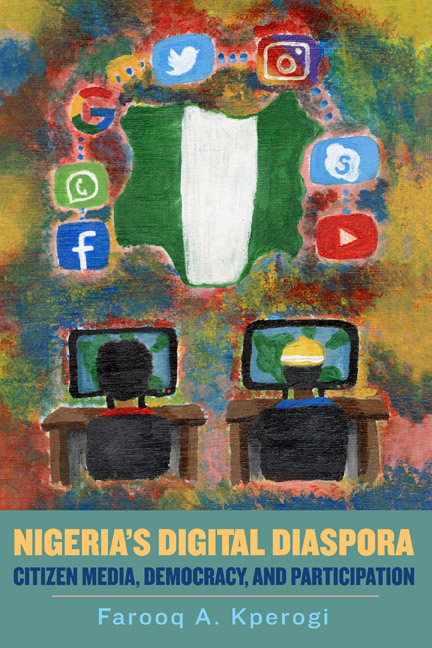Book contents
- Frontmatter
- Dedication
- Contents
- Acknowledgments
- Introduction
- 1 Citizen and Alternative Journalism: Mapping the Conceptual Contours
- 2 The Nigerian Press: From Colonial Evangelism to Guerrilla Journalism
- 3 The Nigerian Digital Diasporic Public Sphere
- 4 Profiles of Diasporic Citizen Media Sites
- 5 From the Diaspora to the Homeland: Role Reversal in News Flows
- 6 The Nigerian Government’s Response to the Diasporic Citizen Media
- 7 Domestic Online Media, Social Networked Journalism, and Participation
- 8 Mainstreaming of Diasporic Citizen Journalism and Implications for Nigerian Journalism
- Notes
- Bibliography
- Index
1 - Citizen and Alternative Journalism: Mapping the Conceptual Contours
Published online by Cambridge University Press: 13 April 2021
- Frontmatter
- Dedication
- Contents
- Acknowledgments
- Introduction
- 1 Citizen and Alternative Journalism: Mapping the Conceptual Contours
- 2 The Nigerian Press: From Colonial Evangelism to Guerrilla Journalism
- 3 The Nigerian Digital Diasporic Public Sphere
- 4 Profiles of Diasporic Citizen Media Sites
- 5 From the Diaspora to the Homeland: Role Reversal in News Flows
- 6 The Nigerian Government’s Response to the Diasporic Citizen Media
- 7 Domestic Online Media, Social Networked Journalism, and Participation
- 8 Mainstreaming of Diasporic Citizen Journalism and Implications for Nigerian Journalism
- Notes
- Bibliography
- Index
Summary
Citizen journalism and alternative journalism are core constructs in this book and have been used to characterize emergent models of decentered, non-oligopolistic journalisms. An awareness of the differences between them is central to the preoccupations of this book. In this chapter, I define alternative and citizen models of journalism, map their conceptual contours, and point out their intersections in the age of the Internet. In reviewing the corpus of research that has been done in conceptualizing citizen and alternative journalism, I reveal the gaps in the extant literature. How might we conceive alternative journalism? How is it different from and similar to citizen journalism? And how are these categories useful for this book?
Although it is customary for some scholars to conflate citizen media and alternative media, I argue in this book that they are different. In the new media literature, citizen journalism is traditionally conceptualized as online “news content produced by ordinary citizens with no formal journalism training.” It needs to be noted, however, that citizen journalism does not necessarily preclude people with formal journalism training so long as they partake in nonprofessionalized, user-generated news-gathering and dissemination practices. Alternative journalism, on the other hand, is not merely nonprofessionalized and noninstitutionalized journalism produced by ordinary citizens; it is also purposively counterhegemonic and “closely wedded to notions of social responsibility, replacing an ideology of ‘objectivity’ with overt advocacy and oppositional practices.”
Whereas citizen journalism (at least the way this term is widely understood and applied in new media scholarship) is enabled largely by the emergence of the Internet, alternative journalism not only preceded the Internet but is as old as journalism itself. And although all online alternative media— to the extent that they are products of journalism by ordinary citizens outside institutional and professional structures, are citizen media—not all citizen media are alternative media. To be alternative, media citizen media have to be expressly oppositional and actuated by a progressive, emancipatory political agenda. However, these categories are not neat, unchanging, or invariably mutually exclusive. For one thing, as will be demonstrated throughout this book, notions of what constitutes progressive, emancipatory political agendas vary widely from country to country.
- Type
- Chapter
- Information
- Nigeria's Digital DiasporaCitizen Media, Democracy, and Participation, pp. 16 - 35Publisher: Boydell & BrewerPrint publication year: 2020



